Key takeaways:
- Recognizing personal triggers, such as negative feedback and social comparisons, is crucial in managing imposter syndrome and transforming anxiety into growth opportunities.
- Practicing self-compassion and celebrating small achievements can significantly enhance confidence and reduce feelings of inadequacy.
- Building a support network and seeking professional guidance provides validation, perspective, and effective strategies for overcoming feelings of being an imposter.

Understanding Imposter Syndrome
Imposter syndrome often feels like a relentless internal battle, where you hand over your own accomplishments to luck or timing. I vividly remember landing a prestigious project that I had dreamt about for years. Instead of celebrating, my first thought was, “What if they find out I’m not qualified for this?” This mindset is so common; it leads us to question our worth and abilities, even in the face of undeniable evidence of our success.
The emotional toll can be significant, manifesting as anxiety or even self-doubt. I often find myself thinking, “Am I really capable of this?” It’s fascinating how we can achieve great things yet still feel like a fraud. This cognitive dissonance can create an ongoing cycle of stress and self-criticism that’s challenging to break. Have you ever felt that tug of guilt, as if you were pretending to be someone you’re not?
Understanding imposter syndrome also means recognizing that it often affects high-achievers, those who push their limits. I recall feeling overwhelmed in a team of accomplished colleagues, where I convinced myself that they were all more deserving. This dynamic isn’t merely about self-perception; it’s about the external signals we receive that can exacerbate our feelings of inadequacy. Acknowledging these feelings is the first step towards taking control and reshaping our narratives.
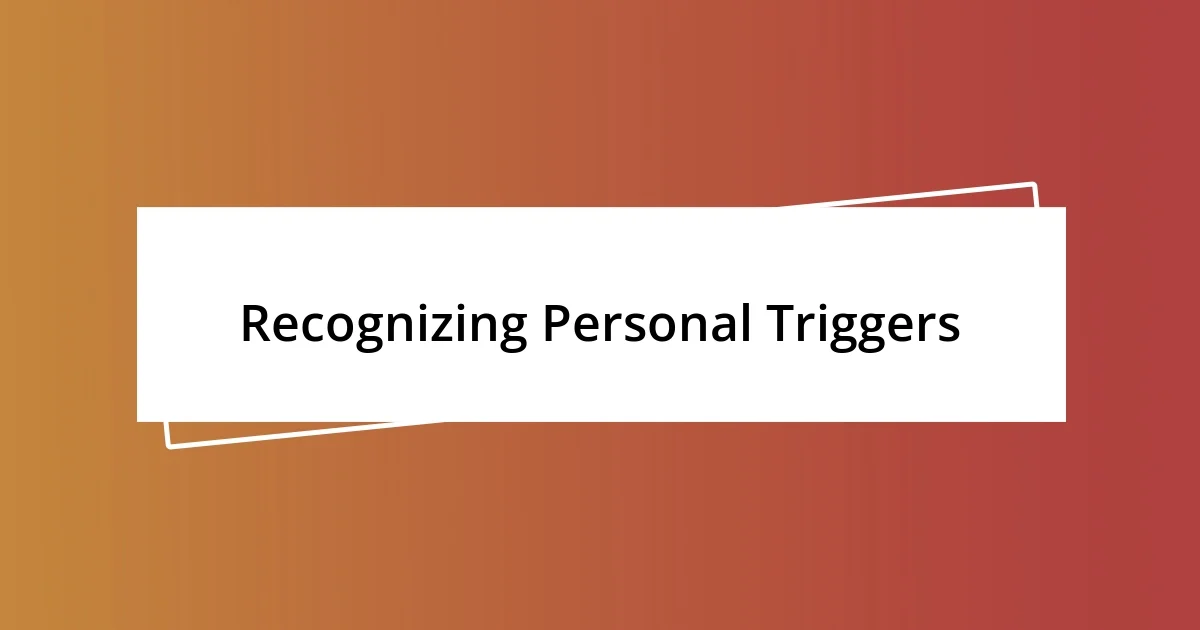
Recognizing Personal Triggers
Recognizing personal triggers is crucial in managing imposter syndrome effectively. For instance, I’ve noticed that whenever I receive negative feedback, no matter how constructive, it sends me spiraling into self-doubt. Suddenly, my mind races with questions like, “Am I really cut out for this?” Identifying that specific trigger allowed me to prepare myself mentally and emotionally for feedback, turning it from a source of anxiety into an opportunity for growth.
There have been situations when I find myself in new social settings, like networking events, where my anxiety levels spike. I often think, “What if I can’t keep up with the conversation?” This feeling of being out of place amplifies my imposter syndrome, making me feel unqualified despite my achievements. Understanding that this environment triggers my insecurities has empowered me to focus on my strengths instead of getting lost in comparison.
Moreover, I’ve realized that comparisons with peers often ignite my imposter feelings. When scrolling through social media, I catch myself feeling inadequate next to friends’ success stories. This comparison opens the floodgates of self-doubt, reminding me of my perceived shortcomings. By recognizing this trigger, I’ve learned to take intentional breaks from social media and focus on my journey, which has been a game changer in how I perceive my worth.
| Trigger | Impact |
|---|---|
| Negative feedback | Increases self-doubt |
| New social settings | Heightens anxiety and feelings of inadequacy |
| Social media comparisons | Invokes feelings of inferiority |
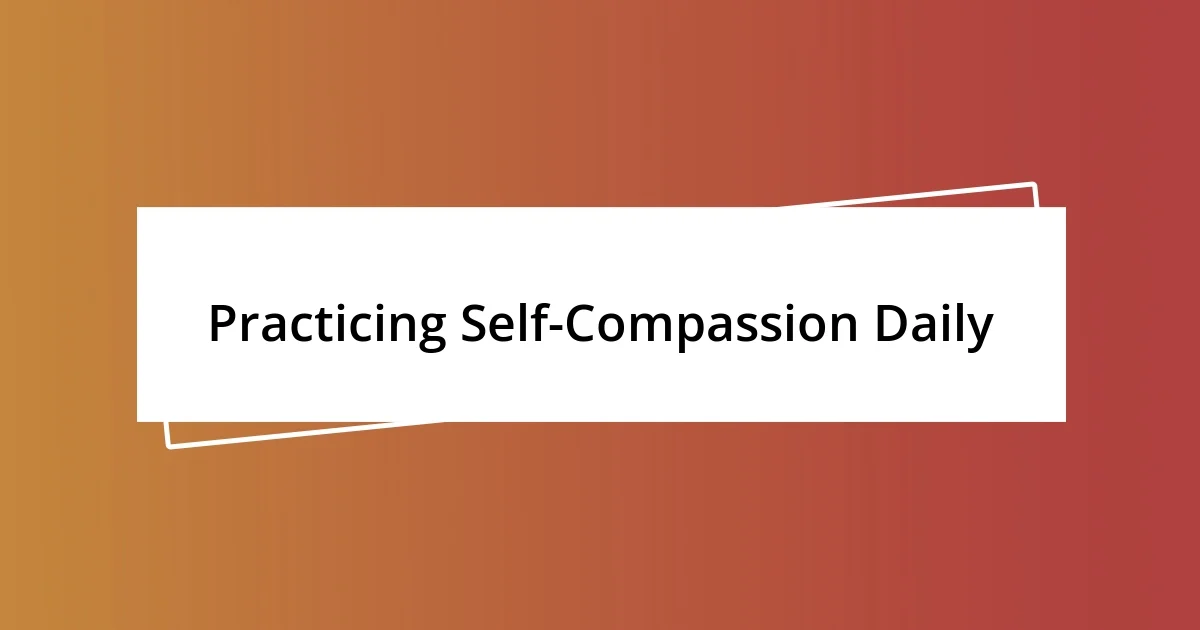
Practicing Self-Compassion Daily

Practicing Self-Compassion Daily
Practicing self-compassion is transformative for combating imposter syndrome. I remember a particularly tough week where I had multiple high-stakes presentations. Instead of being my own worst critic, I decided to acknowledge my feelings of anxiety and remind myself that it’s okay not to be perfect. That simple shift in mindset allowed me to approach my work with a lighter heart and renewed confidence. It’s about treating ourselves with the same kindness we would offer a friend who is struggling.
- Recognize your feelings: Allow yourself to feel disappointed or anxious without judgment.
- Reframe negative thoughts: Replace self-criticism with positive affirmations about your abilities.
- Take breaks: Give yourself permission to step back from stressors, whether that’s work or social obligations.
- Reflect on your achievements: Regularly remind yourself how far you’ve come and what you’ve accomplished.
- Practice mindfulness: Engage in activities like meditation or journaling to center yourself.
Another thing I’ve found helpful is to sprinkle moments of self-care throughout my day. For instance, after a long meeting that left me questioning my input, I’ll take a few quiet minutes to breathe and regroup. I genuinely feel that these small acts not only help ground me but also remind me of my worth beyond my accomplishments. Self-compassion isn’t a one-time event; it’s a daily practice that cultivates resilience and fosters a more positive self-image.
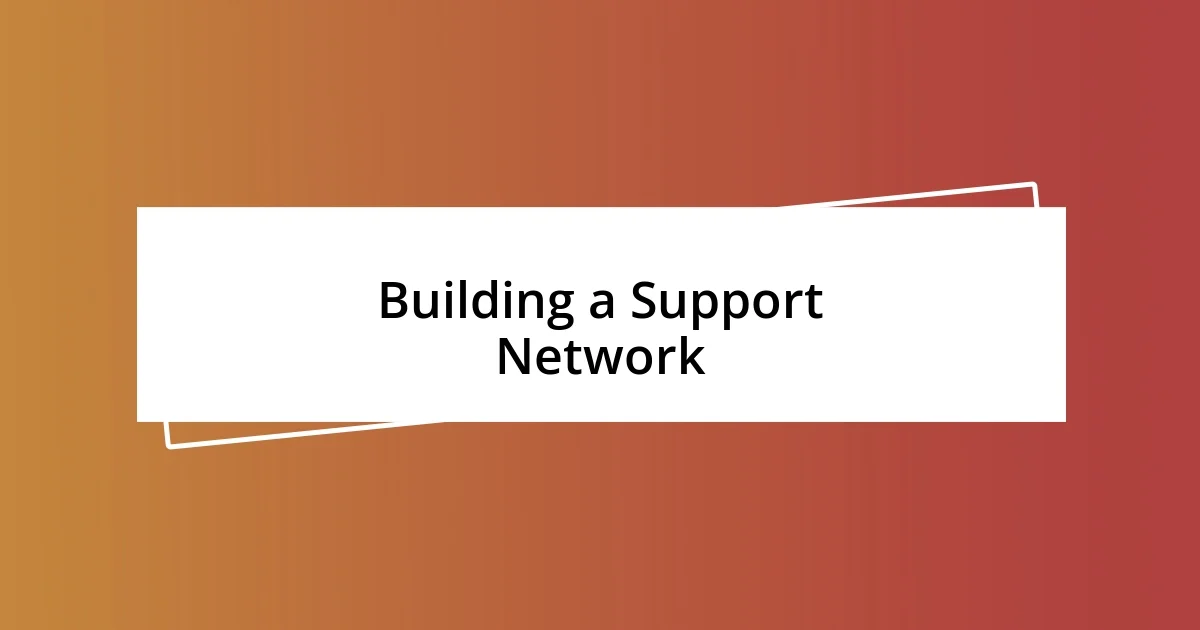
Building a Support Network
Building a support network is one of the most powerful strategies I’ve found in combating imposter syndrome. I remember a time when I felt particularly isolated in my struggles. One day, I reached out to a colleague whom I respected and shared my feelings of inadequacy. To my surprise, they opened up about their own battles with self-doubt. This moment of vulnerability helped us connect on a deeper level, reinforcing that we all face similar fears at times.
It’s essential to surround yourself with individuals who understand what you’re going through. I often seek out friends who not only celebrate my successes but also validate my feelings of uncertainty. This sense of community makes a massive difference. When I feel overwhelmed, having someone to lean on who can remind me of my worth is like having a safety net. It’s incredibly comforting to know I’m not navigating this journey alone.
Engaging in support groups or online communities can also provide relief. I once joined a local network for professionals facing imposter syndrome, and it was eye-opening. Sharing stories and hearing others’ experiences made me realize the commonality of these feelings. Have you ever thought about how many people secretly struggle with the same fears? Establishing relationships in such a setting has not only offered me perspective but also helped build lasting friendships founded on shared experiences.
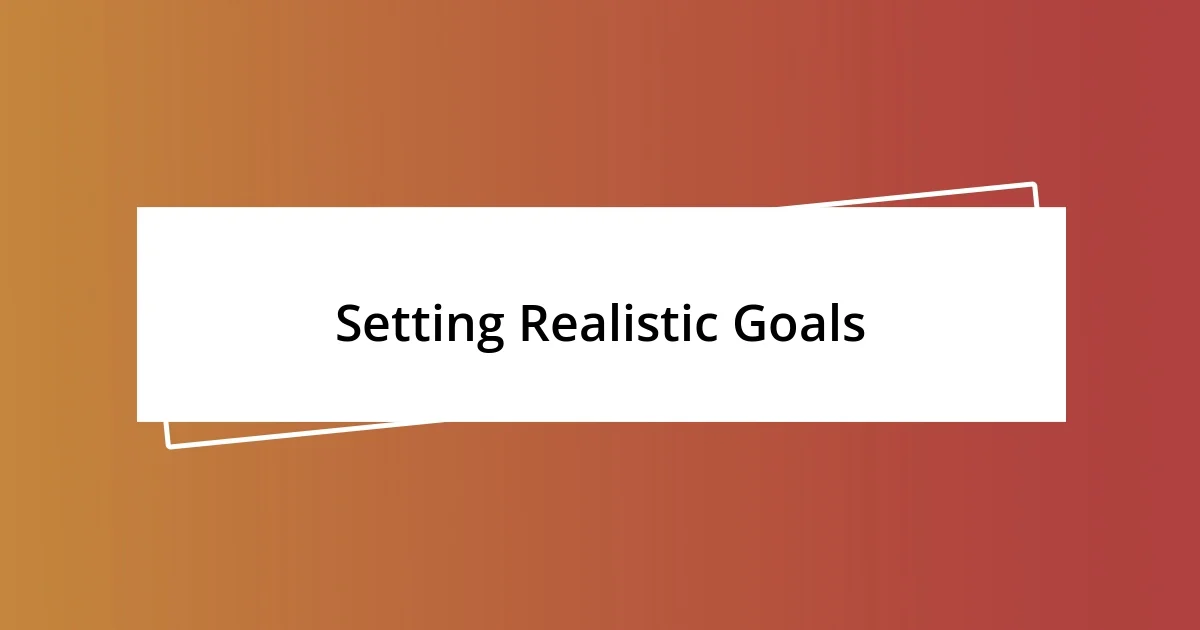
Setting Realistic Goals
Setting realistic goals plays a crucial role in combating feelings of inadequacy and self-doubt. I recall a time early in my career when I ambitiously aimed for unrealistic expectations. I set multiple goals at once, wanting to excel in various areas. The pressure I put on myself was immense, and instead of motivation, it only led to frustration. It dawned on me that breaking my goals into smaller, manageable pieces not only made my path clearer but also allowed me to celebrate small wins along the way, which fueled my confidence.
Another approach I’ve adopted is being specific about my goals. Rather than saying, “I want to be successful,” I started defining what success looks like for me—like leading a project or mastering a new skill. Through this, I learned to evaluate each step based on my own journey rather than external benchmarks. Have you ever felt pressure to measure yourself against someone else’s timeline? Realizing that I could create my own unique definition of success transformed how I viewed my accomplishments and helped me appreciate my progress.
Additionally, I find it beneficial to reassess my goals regularly. Life changes, and so do our aspirations. For instance, I once had a goal to advance to a managerial position within a year, but as I grew and learned more about my interests, I shifted focus toward honing my craft instead. This flexibility not only eased some of my anxiety but also led me to opportunities I hadn’t anticipated. Embracing the idea that my goals can evolve has made me feel more in control and less like an imposter in my own life. Isn’t it liberating to think that what counts is our personal journey, rather than a rigid race to a finish line?
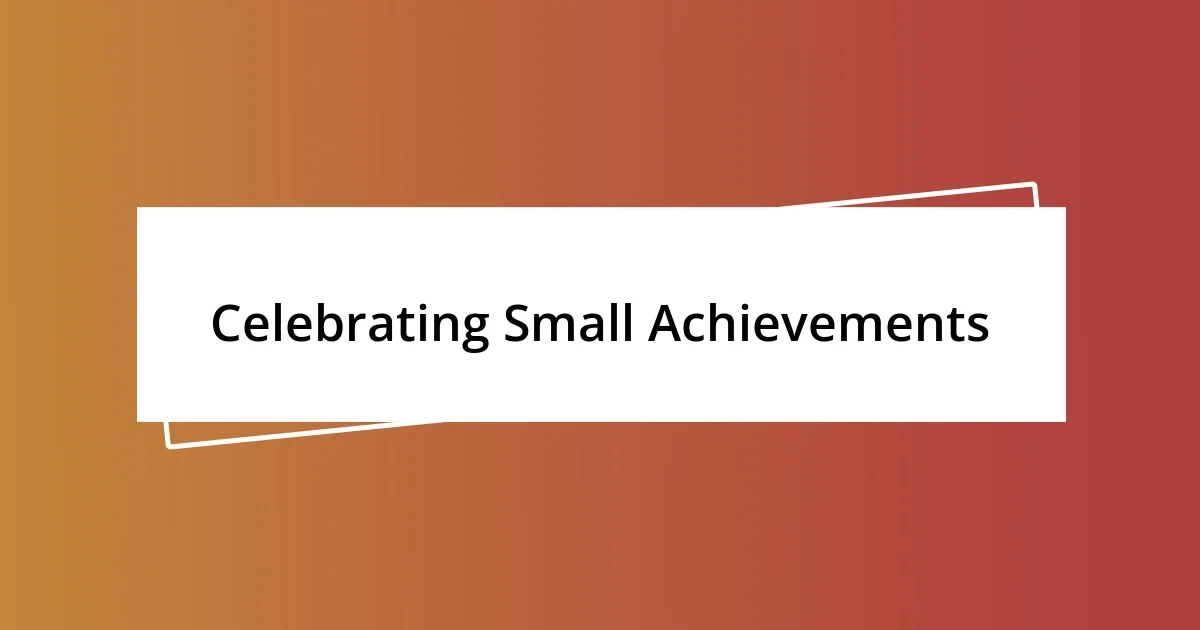
Celebrating Small Achievements
Celebrating small achievements is like giving yourself a little pat on the back—one that often feels richly deserved. I remember small moments, like finishing a challenging task or even just sending a well-crafted email. Each time I acknowledged these wins, I felt a surge of confidence. Do you ever stop to appreciate those little victories in your day-to-day life? It’s remarkable how recognizing these small steps can shift our mindset and help combat feelings of self-doubt.
Sometimes, I create a “success journal”—a simple practice where I jot down even the tiniest accomplishments. Reflecting on those entries is a gentle reminder of how far I’ve come. It might sound trivial, but when I look back and see a list full of seemingly minor achievements, I can’t help but feel empowered. Have you ever tried documenting your successes? I find that it not only counteracts negative thoughts but also provides me with tangible proof of my capabilities and growth.
Even now, I find that sharing these small wins with friends or colleagues amplifies their impact. A simple conversation where I share that I nailed a presentation can lead to a warm exchange of encouragement. It’s fascinating how collective celebration can lift everyone’s spirits, right? I’ve learned that acknowledging small successes creates a positive feedback loop—not just for me, but for those around me, reinforcing the idea that progress is worth celebrating, no matter how minor it may seem at the time.

Seeking Professional Guidance
Seeking professional guidance can be an invaluable strategy when grappling with imposter syndrome. I still remember the first time I decided to reach out to a coach. The feeling was astonishingly vulnerable, yet incredibly liberating. I was skeptical about whether talking to someone could truly help, but that conversation turned out to be a game changer. They provided me with tools to identify and manage those nagging feelings of inadequacy, which in turn allowed me to view my skills in a new light.
In hindsight, I often wonder if I would have uncovered my potential as quickly without expert guidance. I recall a session where my coach unveiled strategies for self-reflection, challenging my negative thoughts directly. It felt eye-opening to articulate fears I had kept bottled up. Have you ever tried discussing your worries instead of letting them simmer? I found that opening up about my experiences validated my feelings and made them feel more manageable, almost as if sharing the burden lightened my load.
Moreover, I’ve come to appreciate the value of having an objective perspective. I once showed my work to a mentor who picked out strengths I had overlooked. It was surprising to hear their positive feedback and see myself through someone else’s eyes. Isn’t it fascinating how an external viewpoint can sometimes illuminate our abilities? That moment was a turning point, making me realize that seeking guidance isn’t a sign of weakness but an empowering step toward personal growth.














